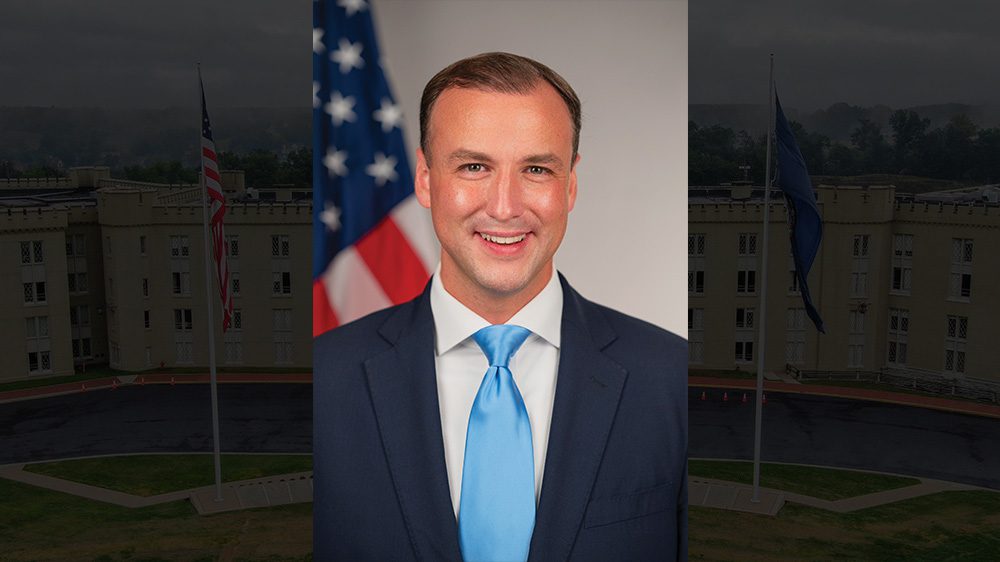Jason Spencer ’13: White House Fellow

U.S. Navy Lt. Cmdr. Jason A. Spencer ’13 is a member of the Class of 2024-25 White House Fellowship.

U.S. Navy Lt. Cmdr. Jason A. Spencer ’13 is a member of the Class of 2024-25 White House Fellowship.
From a first-generation college student to a naval intelligence officer and White House Fellow, U.S. Navy Lt. Cmdr. Jason A. Spencer ’13 has built a career defined by service, hard work, and leadership. As a high school student, Spencer sought guidance and training to pursue a career as a naval officer, and he chose VMI as the place to prepare him for that journey.
He credits the Institute and its vaunted tradition of faculty and alumni mentorship with opening doors for opportunities like his selection to the Class of 2024–25 White House Fellowship, one of America’s most prestigious programs for leadership and public service. As only the second VMI alumnus chosen as a White House Fellow since the program’s founding in 1964, Spencer is committed to applying all that he has learned during this experience to best serve his country and give back by mentoring others, just as VMI did for him.
Matriculating from Long Island, New York, Spencer was raised in a working-class family where his adoptive father, a New York City firefighter, instilled in him a passion for service. Spencer noted that two intelligence failures directly impacted his community on Long Island—September 11, 2001, and Operation Red Wings—which led him to pursue a career in naval intelligence.
With an early inclination for service, Spencer recognized he did not have mentors with national security, military, or intelligence experience. He turned to VMI, where Institute leadership and faculty—including Gen. J.H. Binford Peay III ’62, Brig. Gen. Charles Brower IV, Ph.D., the late Col. James “Jim” Hentz Ph.D., Col. Robert Burnett, Ph.D., Capt. Susan Rabern, Ph.D., and Louis H. Blair—molded and made a lasting impact on him. “As I reflect on my time at VMI, the greatest impact on my growth came from the Institute’s leadership and professors. They shaped me as a person and influenced my career trajectory in ways that still resonate today,” said Spencer. It was not until later in his career that he learned more about his biological family, discovering a legacy of military service. His late father served in the U.S. Navy, and his grandfather and granduncle served in World War II.
“Service turned out to be in my blood, but VMI refined this passion at a critical point in my life,” said Spencer. A distinguished graduate with Institute Honors, he earned a Bachelor of Arts degree in international studies with a minor in national security. Though a dedicated student, he attributes much of his success to professors who, in addition to their breadth of knowledge and experience, gave him their time and thoughtful mentorship. “I would look forward not just to class, but to office hours, their open-door policy, and willingness to sit down with me for hours.” Over these hours, they listened to his thoughts and aspirations to serve the nation and guided his course. Earning a commission as a naval intelligence officer is a competitive process, and he credits VMI with helping him succeed. “The path to naval intelligence would never have happened if it was not for their guidance,” said Spencer.
As a naval intelligence officer, Spencer’s operational tours include service with Strike Fighter Squadron Three Two and assignments aboard USS Dwight D. Eisenhower, USS Carl Vinson, and USS Theodore Roosevelt in support of Operation Inherent Resolve. He also served as director of intelligence for Standing NATO Maritime Group Two aboard USS James E. Williams and USS Forrest Sherman during a deployment to the eastern Mediterranean amid the Russia-Ukraine conflict. Ashore, he held key positions, including assistant chief of targets and aide to the fleet commander in Bahrain and Hawaii, senior intelligence briefer for Navy leadership at the Pentagon, and battle watch captain and executive officer on the Joint Staff. During his naval career, he also earned a Master of Arts degree from the Department of War Studies at King’s College London and a Master of Public Administration as a political-military scholar from the John F. Kennedy School of Government at Harvard University.
“VMI is a leadership crucible. On day one, it teaches you that leadership is not about rank. It is about earning the trust of those around you, the foundation of which is being an authentic leader.”
U.S. Navy Lt. Cmdr. Jason A. Spencer ’13
With a broad range of experience across the tactical, operational, and strategic levels of war, Spencer sought a deeper understanding of how policy was made at the national level and across the interagency. Encouraged by mentors, he decided to throw his hat in the ring for the White House Fellowship.
When applying, Spencer reached out to VMI’s first White House Fellow, U.S. Air Force Gen. Dan “Razin” Caine ’90, who later became chairman of the Joint Chiefs of Staff. Caine responded immediately, inviting him to the Central Intelligence Agency, where he offered him encouragement and advice. “General Caine embodies authenticity to his core,” said Spencer. “One of the most important pieces of advice he gave me as I was going through the process was ‘Be your authentic, genuine self.’” This struck a chord with Spencer, whose own leadership style began to form at VMI and exhibited a similar tenor. “VMI is a leadership crucible. On day one, it teaches you that leadership is not about rank. It is about earning the trust of those around you, the foundation of which is being an authentic leader.”
As a fellow, Spencer has served in two cabinet-level departments and has gotten exposure to the White House’s policy councils. He first served at the U.S. Department of Commerce as a senior advisor in the Office of the Under Secretary for Industry and Security. He was then assigned to the U.S. Department of the Interior as the secretary’s senior advisor for national security affairs and served concurrently on the National Security Council. He said both departments allowed him to see how different parts of the government contribute to national security, particularly in strengthening America’s economic and energy position, while the NSC showcased the importance of convening the interagency to advance national interests. “The fellowship is a broadening experience that gave me exposure to the many levers of power in America’s national security toolkit that I never would have had otherwise.”
Looking ahead, Spencer is ready to apply the insights he gained from this once-in-a-lifetime experience to his continued service in the Navy. “I plan to take what I learned from the fellowship and apply it immediately to leading in the military and intelligence community,” he said, emphasizing how it gave him a deep understanding of the federal government and how to best serve the American people, whether in or out of uniform.
Spencer is excited to pay the experience forward and to open doors for other young leaders, drawing on his own humble beginnings and just as his mentors did for him. “What excites me the most about leadership is helping people find their purpose, passion, and the position from which they can decisively maximize their impact,” he said. “Leadership is not about titles. It is about the positive impact you make on those around you, your community, and nation. I learned this at VMI, just as I learned about the importance of authenticity in leadership. There is nothing more fulfilling than seeing someone you mentored grow, lead, and succeed.”

The assistant editor assists the editor-in-chief in various tasks relating to the production of quarterly and monthly publications, as well as prepares written materials for publication. The assistant editor serves as liaison between class agents and chapter presidents and the Agencies’ publications, as well as provides backup photography for events.